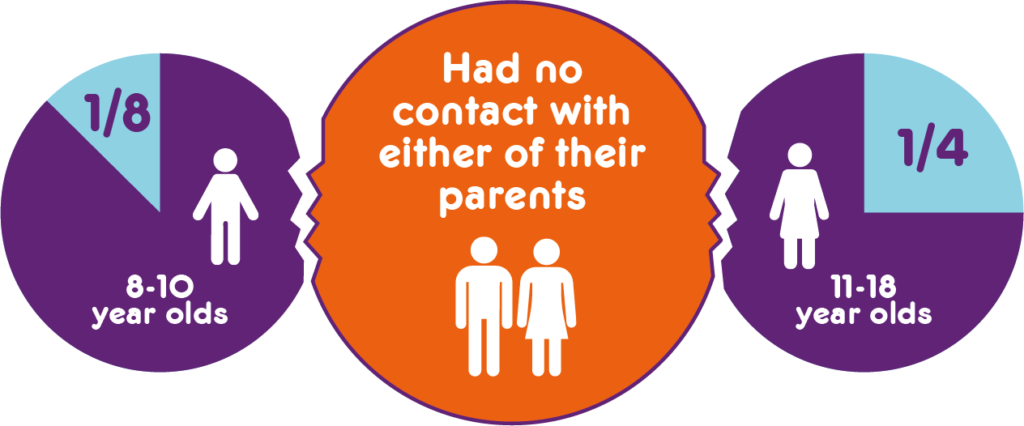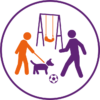Staying connected explores the views and experiences of children in care shared through the Your Life Your Care surveys. It analyses over 7,500 responses and 3,000 comments to questions about spending time with their birth parents, brothers and sisters.
The surveys ask children in care aged 8-18 questions about whether they see their parents, brothers, and sisters frequently enough and gives them the opportunity to write their own comments about how often they have contact.
A team at the Rees Centre, University of Oxford analysed the findings and our Research Report summarises what they found.
To think about what the findings meant for policy and practice the Bright Spots team organised an online workshop to explore the learning and discuss recommendations with young people, professionals and academics.
The Key findings and Recommendations briefing pulls together some of the key findings from the research and the recommendations from the workshop and includes related questions to help managers, practitioners and other decision makers reflect on what the findings may mean for them.
To accompany the reports Coram Voice also worked with A National Voice Ambassadors to create a video that shared care experienced young people’s experiences of what staying connected meant to them.
What did we find?
Feelings about seeing family
Happiness with how often children in care see their family is important to their well-being. The key question is not whether contact is or isn’t happening, but if children feel it is right for them.
Those who are positive about arrangements felt listened to, involved and some were trusted to manage their own contact arrangements.
However, many children and young people were unhappy with how often they saw their families. Most children in care wanted to see their parents and siblings more often, but a small group wanted to see them less.
Children in care who felt they saw parents ‘too little’ wrote about feeling sad, angry and unsettled and relationships feeling strained when they did not see family often enough.
Children in care also wanted to see extended family members, pets or other adults who were important to them.
“I love to see my family. I love to go bowling. I am happy when I am with my family.” Young person aged 8-10 years.
Too little time
For every 10 children in care between 2 and 3 felt they saw their mums, dads, brothers or sisters too little.
Barriers to seeing family included:
- family circumstances (e.g. parental mental health);
- visits were arranged at inconvenient times such as when parents were working;
- workers failing to make arrangements or not taking wishes into account;
- the long distances that they or relatives had to travel or the cost of travel.
Too much contact
Not all children and young people wanted more contact. Out of every hundred children in care, 2 or 3 wanted contact to stop or be cut down.
No parental contact

1 in 8 of children (8-10yrs) and a quarter of young people (11-18yrs) had no contact with either of their parents.
Children and young people did not have contact because they or their parents chose not to; parents circumstances, their parents did not live in the UK or had died. For a small number it had been assessed as not in their best interests.
Contact with siblings
Most of the written comments from children and young people were about how much they enjoyed living with their brothers or sisters and missed those who did not live with them. A few felt they saw them too much.
“I am lucky to live with my sister.” – Young person, aged 11-18 years.
Quality family time
Children and young people commented on small dull contact venues with few activities and the intrusive behaviour of supervisors.
“The place is too small, and so I would like it to be longer and outside (it feels more like a family day out that way).” – Young person aged 8-10 years.
Involvement in decisions
Half of the young people felt involved in decision-making and that their wishes were listened to. Others felt ignored and that decisions were made for them.
They also felt that arrangements were inflexible, not changing as they got older or their family’s circumstances changed.
“I do not want to see my brother or dad. I see my mum too little. Nobody listens when I tell them that I do not want to see a member of my family. Every decision about contact with my family is made for me.” – Young person aged 11-18 years.
Lack of information
Some children and young people wrote about things not being explained or of not being informed about their families, especially their dads.
“I don’t know why I don’t see my dad. I worry about it because he might be dead.” – Young person aged 8-10 years.
Recommendations

Work with all children in care to identify the key relationships in their lives.

Make arrangements for children and young people to maintain contact, develop relationships and reconnect with people who are important to them.

Listen to and involve children and young people in decisions about the arrangements to see and keep in touch with family and others who are important to them.

Keep children in care informed about their families, why they can or cannot see them, and what arrangements have been made for them to spend time together.

Ensure plans are regularly reviewed and reflect the current circumstances, wishes and needs of children and young people and their families.

Normalise family time whenever possible, minimising the use of contact centres and supporting children and families to meet in the community.

Make sure the workforce has the skills and knowledge to prioritise and confidently support children in care to stay connected to the people who are important to them.
